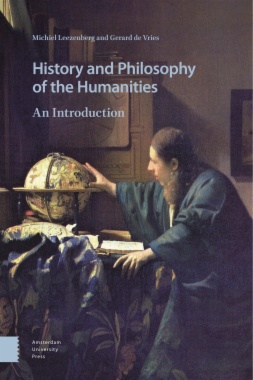The humanities include disciplines as diverse as literary theory, linguistics, history, film studies, theology, and philosophy. Do these various fields of study have anything in common that distinguishes them from, say, physics or sociology? The tripartite division between the natural sciences, the social sciences and the humanities may seem self-evident, but it only arose during the course of the 19th century and is still contested today.
'History and Philosophy of the Humanities: An Introduction' presents a reasoned overview of the conceptual and historical backgrounds of the humanities. In four sections, it discusses:
- the most influential views on scientific knowledge from Aristotle to Thomas Kuhn;
- the birth of the modern humanities and its relation to the natural and social sciences;
- the various methodological schools and conceptual issues in the humanities;
- several themes that set the agenda for current debates in the humanities: critiques of modernity; gender, sexuality and identity; and postcolonialism.
Thus, it provides students in the humanities with a comprehensive understanding of the backgrounds of their own discipline, its relation to other disciplines, and the state of the art of the humanities at large.
- Cover
- Table of Contents
- Preface
- 1. Introduction
- 1.1 The Tasks of the Philosophy of the Humanities
- 1.2 Knowledge and Truth
- 1.3 Interpretation and Perspective
- 1.4 Unity and Fragmentation
- Summary
- Part 1: Standard Images of Science
- 2. The Birth of the Modern Natural Sciences
- 2.1 The Scientific Revolution
- 2.1a Aristotle and the Medieval Sciences
- 2.1b Renaissance Humanism: Eloquence and Learning
- 2.1c The Rejection of Humanism and Aristotelian Science
- 2.1d What Was the Scientific Revolution?
- 2.2 Epistemology and Metaphysics of Classical Natural Science; Immanuel Kant’s ‘Copernican Turn’
- Summary
- 3. Logical Empiricism and Critical Rationalism
- 3.1 Logical Empiricism: The Vienna Circle
- 3.1a Rudolf Carnap: The Logic of Science
- 3.1b The Analytic-Synthetic Distinction and Reductionism
- 3.2 The Vienna Circle and the Humanities
- 3.3 Karl Popper: The Logic of Refutation
- 3.3a Induction, Deduction, Demarcation
- 3.3b Testing Theories
- 3.3c Explanation, Prediction, and the Laws of History
- Summary
- 4. Historicizing the Philosophy of Science
- 4.1 From Empiricism to Pragmatism
- 4.1a The Duhem-Quine Thesis
- 4.1b Willard Quine’s Meaning Holism
- 4.1c Wilfrid Sellars and the Myth of the Given
- 4.2 The Development of Scientific Knowledge According to Thomas Kuhn
- 4.3 Kuhn’s Philosophy of Science: Empiricism, Neo-Kantianism, or Pragmatism?
- 4.4 The ‘Anthropological Turn’
- Summary
- Part 2: The Rise of the Humanities
- 5. The Birth of the Modern Humanities
- 5.1 Michel Foucault’s Archaeology of the Human Sciences
- 5.2 Philosophical Backgrounds: Immanuel Kant and Georg Wilhelm Friedrich Hegel
- 5.2a Kant: Subject and Object
- 5.2b Hegel: Geist and Historicity
- 5.3 Cultural-Historical Backgrounds
- 5.4 Institutional Transformations: Wilhelm von Humboldt’s University Reforms, Bildung, and Nationalism
- 5.5 Conclusion
- Summary
- 6. Developing New Disciplines
- 6.1 Hegel’s Philosophical History
- 6.2 The Rise of Modern Philology
- 6.3 Historiography and Genealogy
- 6.3a Leopold von Ranke
- 6.3b Friedrich Nietzsche
- 6.4 The Emergence of Sociology and Its Rivalry with the Humanities
- Summary
- 7. Between Hermeneutics and the Natural Sciences: In Search of a Method
- 7.1 Introduction
- 7.2 From Biblical Exegesis to General Method: Friedrich Schleiermacher and Wilhelm Dilthey
- 7.2a Schleiermacher and Hermeneutics
- 7.2b Dilthey and the Humanities
- 7.3 Psychoanalysis between Hermeneutics and Natural Science
- 7.4 Neo-Kantianism: Heinrich Rickert and Ernst Cassirer
- 7.4a Rickert
- 7.4b Cassirer
- 7.5 Understanding in the Social Sciences: Max Weber
- 7.6 Hermeneutics as an Ontological Process: Hans-Georg Gadamer
- 7.7 Conclusion
- Summary
- Part 3: Styles and Currents in the Humanities
- 8. Critical Theory
- 8.1 Karl Marx and Dialectics
- 8.2 Marxism, Language, and Literature: György Lukács, Valentin Voloshinov, Mikhail Bakhtin
- 8.3 Antonio Gramsci
- 8.4 The Frankfurt School
- 8.4a Walter Benjamin
- 8.4b Theodor Adorno
- 8.5 Jürgen Habermas
- Summary
- 9. Positivism and Structuralism
- 9.1 Introduction
- 9.2 Émile Durkheim’s Sociology
- 9.2a Sociology of Religion and Sociology of Knowledge
- 9.3 Ferdinand de Saussure and General Linguistics
- 9.4 Noam Chomsky and the Cognitive Revolution
- 9.5 Structuralism in Literary Theory
- 9.6 Structuralism and Psychoanalysis: Jacques Lacan
- 9.7 Conclusion
- Summary
- 10. The Practice Turn
- 10.1 Introduction
- 10.2 Words as Deeds: J.L. Austin and Ludwig Wittgenstein
- 10.2a Wittgenstein on Language Games
- 10.2b Austin’s Speech Act Theory
- 10.3 Michel Foucault’s Genealogy
- 10.4 Pierre Bourdieu’s Reflexive Sociology
- 10.4a The Notion of Habitus: Beyond Structure and Agency
- 10.4b Bourdieu’s Sociology of Culture: Fields and Capitals
- Summary
- Part 4: Modernity and Identity
- 11. Critique of Modernity
- 11.1 Introduction: Modernity, Postmodernity, and Postmodernism
- 11.2 Postmodernism, Poststructuralism, and the Philosophy of Difference: ‘French Theory’
- 11.2a Jacques Derrida: Deconstruction
- 11.2b Gilles Deleuze: The Philosophy of Difference
- 11.3 Thinkers on Postmodernity
- 11.3a Postmodernism and the Legitimation of the Humanities: Jean-François Lyotard
- 11.3b Richard Rorty’s Postmodern Bildung
- 11.4 Conclusion: Beyond (Western) Modernity
- Summary
- 12. Gender, Sex, and Sexuality
- 12.1 Introduction
- 12.2 Gender and Gender Metaphors
- 12.3 Foucault and the History of Sexuality
- 12.4 Gender and Performativity: Judith Butler and Queer Theory
- Summary
- 13. Postcolonialism
- 13.1 Introduction
- 13.2 Postcolonialism and the Humanities: Edward Said and Martin Bernal
- 13.2a Said and Orientalism
- 13.2b Bernal and Classical Philology
- 13.3 The Subaltern Studies Group and Its Offshoots
- 13.4 Beyond Postcolonialism: Globalization and Global History
- Summary
- Further Reading
- Glossary
- Index of Names
- Index of Subjects

